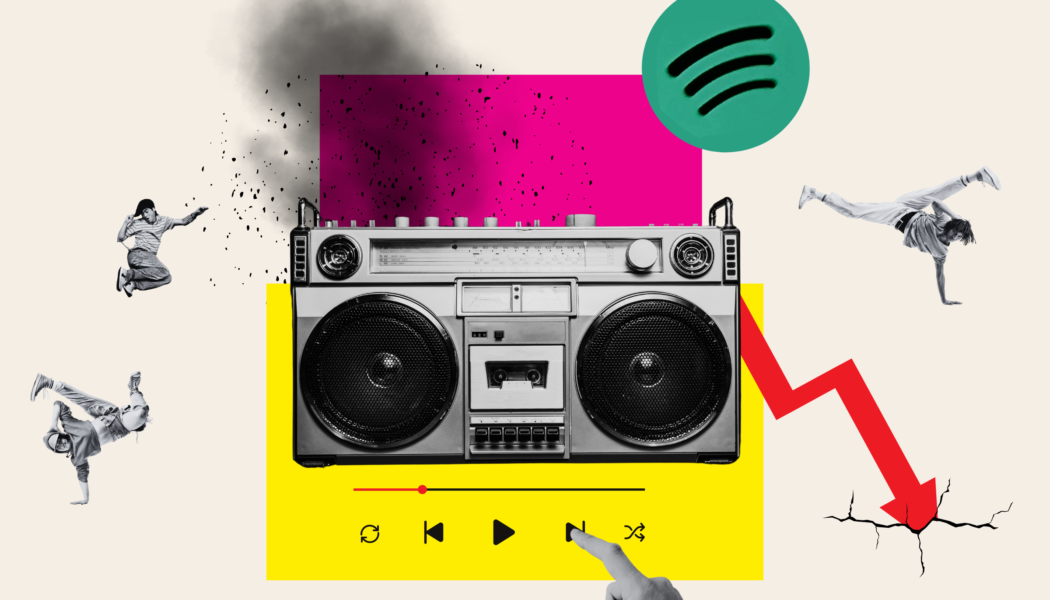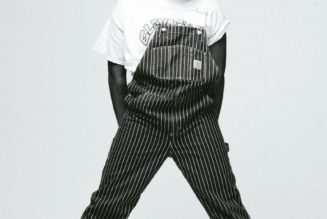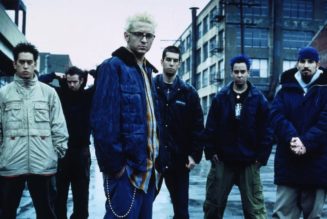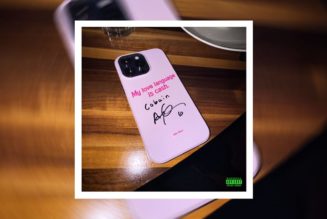It was only in 2018 when hip-hop surpassed rock ‘n’ roll to become the most popular music genre in the U.S., but its glory was short-lived.
In 2023—the year when hip-hop celebrated its 50th birthday— the music genre that gave a voice to millions seemed to be losing its appeal.
While 2023 was marked with historic performances by hip-hop royalty at major events, the newer generation struggled to make a dent on the charts.
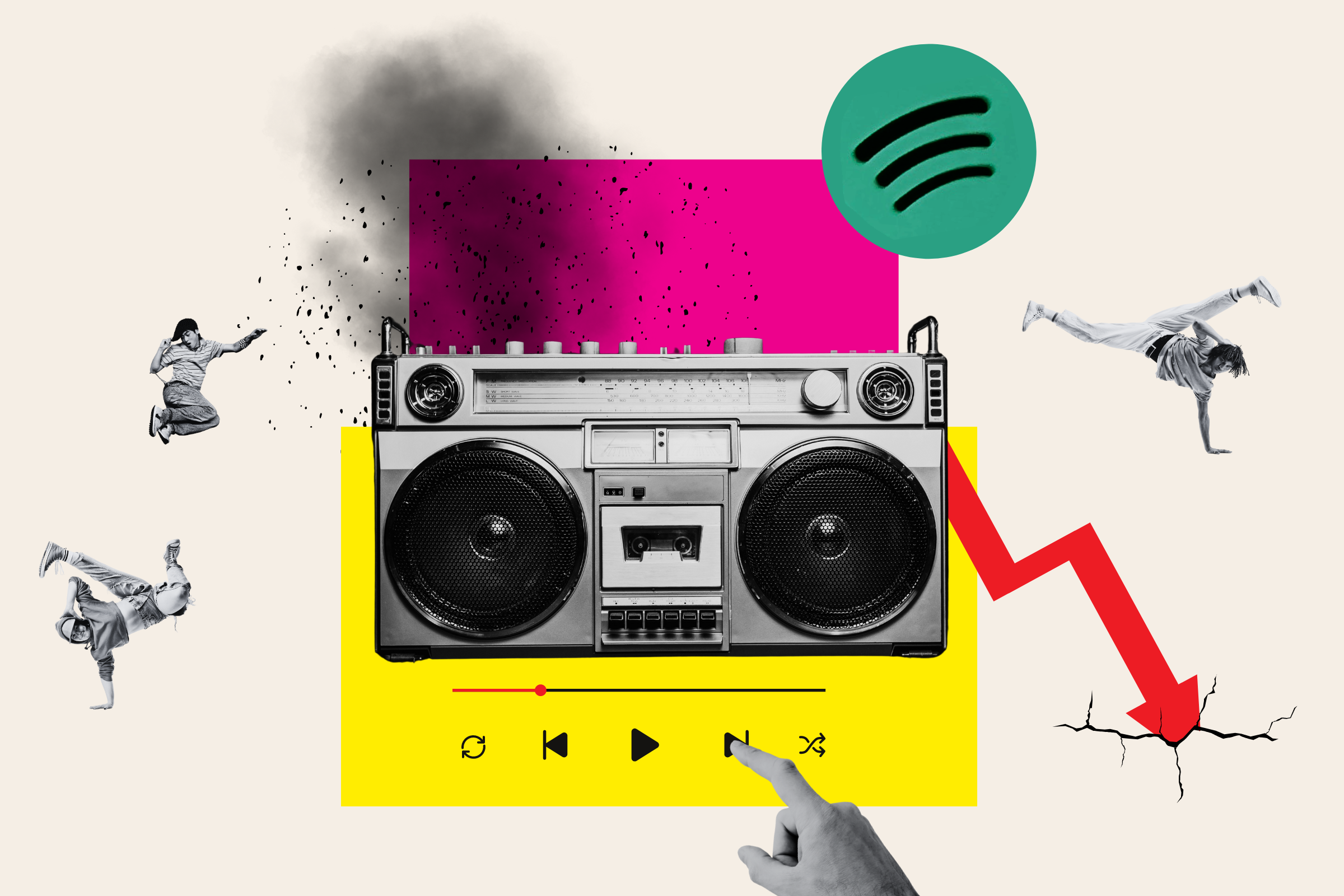
Some experts worried the death knell was ringing for hip-hop, but the story might not be so clear cut.
Photo-illustration by Newsweek/Getty
In fact, media outlets were flooded with think pieces about the “decline” of hip-hop after it experienced a fall in its market share and a failure to dominate music charts for the first time in a long while.
Hip-hop was still the most listened-to genre of music in 2023, it had a 26.8 percent share of the U.S. music market, down from its 2020 peak of 28.2 percent in 2020, according to research by Luminate, and its growth has slowed down drastically since its surge in the 2010s.
But do these numbers mean hip-hop’s popularity is declining or are they telling a different story? The answer is complicated and could have to do with the rise of music streamers taking power from the traditional gatekeepers of music to a simple cyclic downturn or the fact that hip-hop as a genre has become diluted.
Or as musicologist and historian Zachary Diaz told Newsweek, there has been a “musical gentrification” of hip-hop which has seen corporations and big music labels try to profit from its popularity. This has led to a “dilution” of the sound that hip-hop appears in all kinds of music, movies, and advertisements that it has crossed over into other genres, so there is not even a clear idea of what hip-hop is anymore.
“The market share [of hip-hop] has become so massive that it’s this sort of zenith and because it is everywhere, it’s hard to even tell what is hip-hop and what isn’t,” he said.
“It’s going to sound cheesy but because hip-hop has been so appropriated and exploited, it’s like hip-hop is everywhere but at the same time it’s nowhere.”
Treva Lindsey is a professor at The Ohio State University and she told Newsweek that she had hope for the “tremendous possibility” and dynamism in all hip-hop culture— which includes graffiti, break dancing, and deejaying, among others— but the genre might be a victim of its own success.
“I think the mainstream rap industry has been gasping for creative breath for quite some time. I think the radical potential of hip-hop remains on its lower frequencies. What we consume most often though is where I am most critical and underwhelmed,” she explained.
Hip-hop legend Lauryn Hill herself predicted this decline in her song “Superstar” from her groundbreaking 1998 album, The Miseducation of Lauryn Hill, which was just named at the top of Apple Music’s 100 Best Albums.
In that song she rapped, “Hip-hop, started out in the heart/Yo, now everybody tryin’ to chart,” and later adds “Everything you drop is so tired/Music is supposed to inspire,” which is the same point that Lindsey is making.
Hip-hop started as a voice for the Black community to highlight racial injustice, inequality and helped put its culture onto a world stage. But with its mass appeal, has come mass commercialization and perhaps the original purpose which forced hip-hop to be born in the first place.
Lindsey also pointed to a litany of bad actors in hip-hop who have spoiled its image and authenticity.
“For some, this most recent rap battle and the deployment of very serious allegations of intimate partner violence and sexually predatory behavior as “ammunition” signal a deeply entrenched and intractable misogyny that has plagued rap music for decades,” she said, referring to the recent beef between Drake and Kendrick Lamar, and also the very serious allegations of sexual trafficking and abuse leveled at hip-hop mogul Diddy, aka Sean Combs. He has denied all allegations.
“For other folks, the hyper-commercialization and apolitical tenor of mainstream rap music are sources of ire and disappointment. I think some people may be welcoming its decline in the commercial sphere as they await innovation from the marginalized Black and Brown communities that pioneered hip-hop over 50 years ago.”
It’s not all doom and gloom for hip-hop though. The numbers in 2024 are showing the genre is making an impressive comeback. There have been multiple No. 1 hip-hop albums and singles on the Billboard charts, reversing the 2023 trend. Just earlier this month, Nicki Minaj‘s Pink Friday 2 world tour became one of the highest-grossing hip-hop tours of all time.
This year is marking a rebound for hip-hop, but also the potential for “a new Black music culture to emerge,” according to Lindsey who argued, “The cycle of Black musical innovation is one that suggests we are perhaps on the precipice of something new.”
She also believes there is hope for hip-hop because she believes its “decline” is the state of “mainstream rap music.”
“Hip-hop still provides a space for millions across the world to express themselves- whether through… expressive outlets. But the mainstream rap industry is what’s got eyebrows raised and rightfully so,” Lindsey concluded.
Uncommon Knowledge
Newsweek is committed to challenging conventional wisdom and finding connections in the search for common ground.
Newsweek is committed to challenging conventional wisdom and finding connections in the search for common ground.
